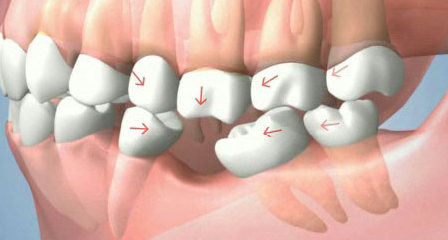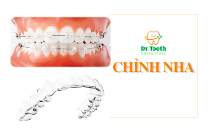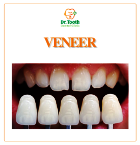Created at: 2020-01-09 03:17:58
1. Function of each tooth
Basically, each person has the same number of teeth: 8 incisors, 4 canines, 8 small molars, 12 large molars. Each tooth, tooth position has different chewing function.
.jpg)
The loss of teeth makes it difficult to eat and chew
- Incisors are the teeth in front of the arch, shaped like a shovel and have sharp sharp edges. Incisors act as biting, tearing food into small pieces.
- Canines are located at the angle of arch, close to incisors. The canines are shaped like a spear, the thick canine teeth are very pointed and sharp. The task of this tooth is to clamp and tear food.
- Small molars have a flat bite surface, cube-shaped crowns. On the surface of small molars are divided into 2 regular, pointed. Teeth are used to tear and stamp food.
- Large molars are the largest teeth in the arch. Large molars are flat, wide and large, with very complex shapes. The main task of large molars is to chew and crush food before putting it into the stomach.
When a tooth is lost, many teeth or total teeth are lost, meaning that the molars are no longer perfect. Lacking the role of one or more teeth will cause the remaining teeth to overburden and tend to weaken. Full tooth loss, tooth loss people will no longer feel delicious chewing food. Because the remaining teeth can not afford to puree the food, making people lose teeth can not enjoy the full flavor of the food they are using.
In the case of tooth loss people have a habit of fast food, hurry, food will not be handled thoroughly and moved to the stomach. When food is not crushed, the digestive system will overload, making the body tired. When the stomach does not absorb enough nutrients the body will weaken leading to weight loss.
2. Effect of tooth loss on chewing food
The first gland of the digestive system is chewing, but for people with tooth loss, total tooth loss, chewing is no longer completely. Eating chewing is difficult, grinding food is not thorough, the food after chewing is still rough, not reaching the taste when eating. Those are the concerns of your uncles and brothers when they lose their teeth.
.jpg)
Loss of teeth makes chewing no longer delicious, leading to anorexia and weakness
The digestive system is affected by food that is not crushed
The food is not crushed will greatly affect the digestive system, especially the stomach - where direct reception of food. In the case of missing front teeth, food will not be shredded, resulting in chewing problems.
But without fangs or molars, the food is always in a state of not being crushed. If this happens in the long run, meals for people with tooth loss will last longer because it takes a lot of time for chewing but not delicious.
Target jaw bone, gum atrophy, occlusal bite
In addition, the gums will shrink when damaged and lost teeth. When a tooth is lost, the jaw bone in the missing tooth position will fill the space of the missing tooth and gradually destroy the bone. When bone resorption, the lost tooth position will be concave, the other teeth will tend to shift, leaning into the empty position, resulting in crooked teeth.
The surrounding teeth operate overloaded
The part of the gums in the place where the tooth is missing will heal, but when the other teeth chew, the food will fall into the gums at the hole in the place where the tooth is lost. Food will rub against the gums to hurt, infection. When the gum touches hard food, there is a risk of bleeding, sores and infection if left untreated. If the gums become inflamed it can spread to nearby teeth.
When teeth are lost, the oral cavity will not perform the perfect chewing process in a short time. The remaining teeth are forced to take over the chewing function of the missing teeth. If the tooth loss does not replant the teeth in time, it will lead to the loss of jaw bone at the location of tooth loss. The jaw bone will be thinned and combined with the pressure of chewing overload of other teeth to compensate for the loss of teeth and joint fatigue.
3. Loss of teeth that deviates from occlusal joints affects chewing
Missing one tooth, many teeth, total tooth loss have certain effects on chewing activity. The occlusal deviation is considered a consequence of chewing without the involvement of the combined teeth due to tooth loss. The occlusion bite usually takes place over the long term from the moment of tooth loss.
The adjacent tooth is tilted toward the loss of teeth, resulting in a deviated bite

The teeth are inclined, dislocated to the place where the tooth is lost, causing poor aesthetic, dislocated bite, pain when chewing
In the early stages of tooth loss, jaw bone cells fill the empty root space and heal. When losing teeth, the jawbone will not be impacted, so it will gradually disappear. When the jaw bone is destroyed, the bone wall at the position of tooth loss will be very thin, slack, causing the adjacent teeth to tilt and deviate to the missing tooth space.
In this process, the root is considered the root of a green tree, the jawbone resembles a fertile land. But when the tree is removed, the area where the tree will flatten the root and no protection should begin to degenerate. Other trees will tend to grow, leaning toward the void to absorb more sunlight.
On the other hand, the tilted, deviated teeth will not coordinate to chew together because of dislocated bite. Especially when the adjacent teeth tend to fall into the void, they will create a depression in the middle of the jaw. The fact that the teeth on the arch of the jaw are not equal will cause the teeth on the opposite arch to develop according to the natural mechanism so that the occlusal position overlaps with each other to chew.
Long, loose teeth, difficult to chew even lead to tooth loss
.jpg)
Loss of teeth will cause the teeth surrounding the missing tooth position to bite and lead to compression
When the depression is too deep, the teeth on the opposite arch will grow, causing laxity, receding gums, and weakening. Continuing for a long time increases the risk of losing these teeth on the opposite arch.
The normal process of chewing food will be crushed and transferred to the stomach easily. But when the jaw is dislocated, the teeth will not be on the same surface to chew together. So when people lose their teeth, the jaw joint is dislocated during eating will be slower due to difficulty chewing food. The post-chewing food of a toothless person is still in a very rough state.
Target jaw bone, sunken cheeks, aging facial skin
.jpg)
Long-term tooth loss can cause cheek sagging, aging facial skin
Jawbone, teeth, gums located in the oral cavity all have the effect of supporting, forming the angular face. So when losing teeth, the most obvious jaw deviation is the process of changing the face from the cheekbone to the chin. Bone resorption makes the cheeks dull and the chin is pointed. The face near the lips is also sagging because it's not supported, so it usually looks old before its age.
Dislocated jaw directly affects the jaw, the first is the thin bone, fragile, difficult to replant dentures, jaw shrinking loss of aesthetics. When the jaw is dislocated, many disproportionate positions on the molars are constantly under pressure, resulting in nerve compression. Headaches, shoulder pain in the neck, joint fatigue in the process of tooth loss take place very often.
4. Tooth loss makes the stomach always in overload
The stomach has the function of containing and kneading, soaking wet gastric juice to digest food to provide nutrition for other healthy development agencies. When one tooth is lost, many teeth are lost or the whole teeth are jawed, the chewing system will be weakened, the food transferred straight to the stomach is usually raw food that has not been thoroughly crushed.
Raw food, it will be difficult to digest, gastric juice is forced to secrete more to digest food. The stomach wall must operate at full capacity to contract and knead to metabolize all the nutrients. The time it takes to digest the food of a person with a tooth loss or a joint bite will be longer because the stomach has to work harder. In the long run, the stomach will be overloaded due to continuous work so it is easy to get hurt, resulting in stomach pain.
The stomach is hurt, the body will produce the phenomenon of anorexia, loss of appetite. Stomachs of people with tooth loss are often weak. The cause is damage that has not recovered, does not absorb all nutrients that cause digestive disorders.
Digestive system problems, disorders, will cause many problems for the body. The body does not provide enough nutrition, the organs will work ineffectively. The body is depressed, always tired and anorexia will cause weight loss, aging and ineffective work.
5. Solutions to overcome tooth loss
Full tooth loss, loss of one or more teeth causes digestive problems and indirect effects on the body. Dental implants are the only way for people who lose their teeth to eat and chew well and improve their digestive system and aesthetics.
Currently there are many methods of implantation such as removable jaw, ceramic bridge, implant with advantages and disadvantages.
Removable jaw is very safe for the body, easy to assemble but only chew soft things, easily lose jaw bone and often bad breath, ...
Porcelain bridges also have many advantages because of their high aesthetics, more stable chewing than removable jaws. However, porcelain bridges are more likely to target jaw bone aging. When making porcelain bridges, it is necessary to sharpen 2 adjacent teeth so it is easy to cause damage to the pulp leading to pain and loss of 2 real teeth to be sharpened, prone to gum disease, ...
Implant is considered the most modern method of dental implant up to the present time. Implants ensure both aesthetic factors, chewing like natural teeth and apply to most conditions of tooth loss such as 1 tooth loss, multiple teeth or total tooth loss. Besides, Implant teeth after being planted will integrate fully with the bone. The life of Implant teeth up to 20 years even up to a lifetime if you are carefully cared for by your uncles and aunts.
Implant implant is the most optimal method today for people who have lost one tooth, many teeth or lost all their teeth. People who lose their teeth can eat and chew freely, laugh freely and continue to enjoy life to the fullest. So after implant implant, the uncles and aunts are always happy, confident in communication and always enjoy the favorite delicacies.
DR. TOOTH DENTAL CENTER – Huynh Thuc Khang Branch
Address: 90 Huynh Thuc Khang – Tan Lap - Nha Trang
Hotline: (0258)3515 788 - 0813 515 788
Business Hours: 7h30 – 18h30 (Every Mon to Sun).
- Google+/ Google Maps











